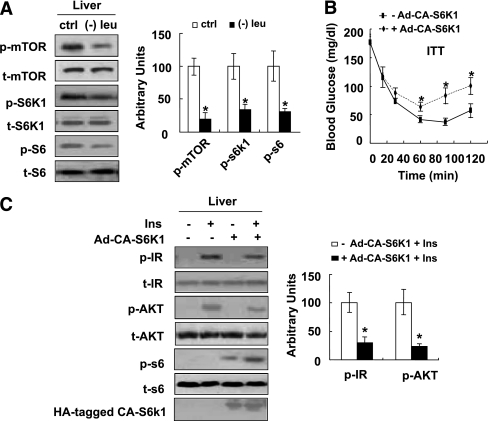FIG. 4.
Leucine deprivation increases insulin sensitivity by decreasing mTOR/S6K1 signaling in vivo. A: Mice were fed a control (ctrl) or (−) leu diet for 7 days. B and C: Mice were infected with adenovirus HA-tagged constitutively active S6K1 (+ Ad-CA-S6K1) or control green fluorescent protein adenovirus (− Ad-CA-S6K1) via tail-vein injection. ITT was examined after mice were fed a (−) leu diet at day 6 (B), and insulin signaling was examined before (− Ins) and after (+ Ins) 2 units/kg insulin stimulation for 3 min at day 7 (C). Data are means ± SEM of at least two independent experiments with mice of each group for each experiment (n = 5–7 each group). Statistical significance is calculated by two-tailed Student t test for the effects of (−) leu vs. control diet (*P < 0.05) (A) and with vs. without CA-S6K1 after insulin stimulation (*P < 0.01) (B and C). p-mTOR, p-S6K1, and p-S6 protein (A) (left, Western blot; right, quantitative measurements of p-mTOR, p-S6K1, and p-S6 protein relative to their total protein); ITT (B); p-IR, p-AKT, p-S6 protein (C) (left, Western blot; right, quantitative measurements of p-IR and p-AKT, protein relative to their total protein).

